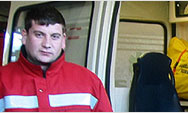Leasing Sows Seeds of Prosperity for Georgian Agriculture
It’s wild mushroom season in the mountains near Sachkere, Georgia and every day villagers of all ages fan out into the cool forests to collect succulent porcinis and chanterelles.
They sell some mushrooms in the local market, but the bulk of their harvest goes to Kvicha Grdzelidze, who runs a mushroom drying business with his partner, Mamuka Nozadze. Dried wild mushrooms have a high demand in the European markets.
If the weather cooperates, the partners can sun-dry up to 500 kilograms of mushrooms per day. But the partners live in fear of rain during the sun-drying process, which can damage or destroy the entire product. It can take up to two hot, dry days to turn 500 kilograms of fresh mushrooms into 50 kilograms of dried mushrooms.
Yet that daily production is only a fraction of the estimated 10 tons of mushrooms that could be harvested each day in the Sachkere district during the spring and fall seasons, each of which lasts about a month.
With a mechanical drying machine, they could process 20 times as many mushrooms without having to worry about the weather. The mushrooms would also be of higher quality and good enough to sell on the international market: a kilo of dried mushrooms that sells for $9 in Georgia would fetch more than twice that price in European markets.
 |
| Examining dried mushrooms ready for market. |
But with a price tag of $23,000, a mechanical drying machine costs many times more than Kvicha and Mamuka make in a year.
“We could never afford to buy such a machine, although it would make our work so much easier,” said Mamuka. And even if banks would lend money to such a small business, he said, “interest rates are very high in Georgia for beginning entrepreneurs.”
Experts from AgVANTAGE, a USAID-funded agricultural project, say that there is a way for farmers like Kvicha and Mamuka to gain access to modern, efficient equipment they otherwise could not afford. It’s called leasing, and AgVANTAGE recently held a four-day training seminar to teach employees at two Georgian leasing companies how to make agricultural leasing work in Georgia.
“This is an absolutely new financing tool for Georgia,” said George Gvalia, deputy director of the Georgian Leasing Company, one of the two leasing companies currently operating in Georgia. He said that while agriculture accounts for the largest share of the Georgian economy, few farmers or agribusinesses have the resources to modernize their equipment; leasing offers a way to help the agricultural sector without excessive risk.
Roger Bird, director of the leasing component of AgVANTAGE, explained that because leasing is just beginning in Georgia , leases have been structured much like traditional loans. The seminar taught modern financing techniques that will provide customers like Kvicha and Mamuka the needed flexibility that only leasing can offer.
Leases do not require large amounts of collateral, since the leasing company owns the equipment that the customer uses. Also, monthly payments are lower and if new and better equipment is invented, the customer can return the old equipment at the end of the lease and lease a newer machine.
Mamuka Nozadze said he also likes the fact that his lease payments would be set up to allow him to make a higher payment during each year’s mushroom season, when cash is plentiful, and to make lower payments during the rest of the year.
He said they expect to be able to hire as many as 500 villagers to collect mushrooms once the new machine is up and running. And with their increased profits, Kvicha and Mamuka plan to expand their processing into other dried products as well.
“Working the old way, our profits were so small,” he said. “It is hard to say how many years it would have taken us to save the money to buy such a machine. And now, we will soon be ready to process huge amounts of mushrooms.”
Back to Top ^
|


